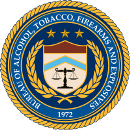Executive Editor
They’re stirring the alphabet suit again in Washington, DC. This time it’s the gun cops.
As Evan Perez reported in the Wall Street Journal (WSJ) in August, the Bureau of Alcohol, Tobacco, Firearms and Explosives (ATF) has been thinking about turning its unwieldy seven-word name into something a little snappier. At the time, he wrote that ‘Violent Crime Bureau’ was a candidate.
Now, WSJ report, quietly, the name change has happened—at least a little bit. For a few days now, the bureau has featured the new name at the top of its home page (atf.gov), just below the old name. The site’s top banner reads, “Bureau of Alcohol, Firearms and Explosives / The Violent Crime Bureau,” or you can say ATF-VCB for short, if you like.
But some people, especially in the pro-gun movement have been using BATF for years, while others have added the explosives in BATFE.
TGM, and its predecessor Gun Week, always tried to use just ATF, and will continue to do so. There’s no ATF-VCB for us. It’s still the same old gang, so ATF will suffice.
The new name doesn’t have any legal status yet. Asked about changing names on Sept. 19 by WSJ, ATF acting director B. Todd Jones said, “That’s a concept that we batted around.” He added that the agency was focused on returning to its fundamental mission and said, “How it’s labeled is less important than what it does.”
The WSJ story said the Violent Crime Bureau moniker reflects the agency’s ambition to take the lead in tackling violent-crime outbreaks in big cities such as Philadelphia that have seen an increase in murders and drug-related shootings. The agency’s current name is something of an anachronism because it brings fewer than a hundred alcohol and tobacco cases a year. And its reputation as a firearms regulator took a hit because of the Fast and Furious scandal, the subject of a new report from the Justice Department’s inspector general (see this article in today’s Journal).
But the gun cops have had a number of name changes over the years and Wikipedia, the free online encyclopedia, recaps those changes going back to the 19th century, and the agency’s early assignment on alcohol.
The ATF was formerly part of the United States Department of the Treasury, having been formed in 1886 as the “Revenue Laboratory” within the Treasury Department’s Bureau of Internal Revenue. The history of ATF can be subsequently traced to the time of the revenuers or “revenoors” and the Bureau of Prohibition, which was formed as a unit of the Bureau of Internal Revenue in 1920, and was made an independent agency within the Treasury Department in 1927, but was transferred to the Justice Department in 1930, where it became, briefly, a division of the FBI in 1933.
When the Volstead Act, which established prohibition, was repealed in December 1933, the Unit was transferred from the Department of Justice back to the Department of the Treasury where it became the Alcohol Tax Unit (ATU) of the Bureau of Internal Revenue. Special Agent Eliot Ness and several members of “The Untouchables,” who had worked for the Prohibition Bureau while the Volstead Act was still in force, were transferred to the ATU. In 1942, responsibility for enforcing federal firearms laws was given to the ATU.
In the early 1950s, the Bureau of Internal Revenue was renamed “Internal Revenue Service” and the ATU was given the additional responsibility of enforcing federal tobacco tax laws. At that time, the name of the ATU was changed to the Alcohol and Tobacco Tax Division (ATTD).
In 1968, with the passage of the Gun Control Act, the agency changed its name again, this time to the Alcohol, Tobacco, and Firearms Division of the IRS and first began to be referred to by the initials ATF. In Title XI of the Organized Crime Control Act of 1970, Congress enacted the Explosives Control Act, 18 USCA Chapter 40, which provided for close regulation of the explosives industry and designated certain arsons and bombings as federal crimes. The Secretary of the Treasury was made responsible for administering the regulatory aspects of the new law, and was given jurisdiction over criminal violations relating to the regulatory controls. These responsibilities were delegated to the ATF division of the IRS, and the Secretary of the Treasury and the Attorney General were given concurrent jurisdiction over arson and bombing offenses.
In 1972 ATF was established as a separate Bureau within the Treasury Department with Rex D. Davis becoming the bureau’s first director, having headed the division since 1970. During his tenure, Davis shepherded the organization into a new era where federal firearms and explosives laws addressing violent crime became the primary mission of the agency. However, taxation and other alcohol issues remained priorities as ATF collected billions of dollars in alcohol and tobacco taxes, and undertook major revisions of the federal wine labeling regulations relating to use of appellations of origin and varietal designations on wine labels, as well as the change to the metric system for labeling the volume of a bottle’s contents.
In the wake of the terrorist attack on the World Trade Center on Sept. 11, 2001, President George W. Bush signed into law the Homeland Security Act of 2002. In addition to the creation of the Department of Homeland Security, the law shifted ATF from Treasury to the Department of Justice. The agency’s name was changed again to Bureau of Alcohol, Tobacco, Firearms, and Explosives. However, the agency still was referred to as the ATF for all purposes




